
The Philadelphia Church
Not Pennsylvania!
| “And to the angel of the church in Philadelphia write,
‘These things says He who is holy, He who is true, “He who has the key of David, He who opens and no one shuts, and shuts and no one opens”: “I know your works. See, I have set before you an open door, and no one can shut it; for you have a little strength, have kept My word, and have not denied My name. Indeed I will make those of the synagogue of Satan, who say they are Jews and are not, but lie—indeed I will make them come and worship before your feet, and to know that I have loved you. Because you have kept My command to persevere, I also will keep you from the hour of trial which shall come upon the whole world, to test those who dwell on the earth. Behold, I am coming quickly! Hold fast what you have, that no one may take your crown. He who overcomes, I will make him a pillar in the temple of My God, and he shall go out no more. I will write on him the name of My God and the name of the city of My God, the New Jerusalem, which comes down out of heaven from My God. And I will write on him My new name.
“He who has an ear, let him hear what the Spirit says to the churches.” ’ (Revelation 3:7-13 NKJV) |

From Ray Stedman: Everyone knows that our historic American city of Philadelphia, Pennsylvania, named for the church to which we come today, means "brotherly love" (although some Philadelphians today call it "the city of the brotherly shove!"). The biblical city was located about 28 miles southeast of the city of Sardis. It was the youngest of the seven cities whose churches are addressed in these letters.
Philadelphia was founded about 150 B.C. by King Attallus of Pergamum, whose nickname was Philadelphus, which means "lover of a brother." This man was noted for the admiration and love he had for his brother, Eumenes, and he named this city in honor of him. One feature about the city, which ties closely to us here in the Bay Area, was that the city was destroyed by an earthquake in 17 A. D., along with Sardis and other cities in that locality. Most of the others recovered rather quickly from the disaster, but the after-shocks continued in Philadelphia for quite a number of years, with the result that the people had to flee the city repeatedly. Tiberius Caesar helped Philadelphia to recover from the earthquake, and out of gratitude the city changed its name to Neocaesarea (New Caesar), and for awhile it bore that name. I mention these facts because they have a bearing on the promises to the church in this letter, as we will see.
This church in Philadelphia is unique among the seven churches because it is the only church the Lord registers no complaint against. This is the church that delights Christ! I have noticed something interesting in reading the various commentators on this letter. The Baptist commentators make the church appear to be a Baptist church, while the Presbyterian commentators make it sound Presbyterian. My own conviction is that the full name of this church was probably the Philadelphia Bible Church, or PBC! The Lord presents himself to this church in a very unusual way, seen in Verse 7 of Chapter 3:
"To the angel of the church in Philadelphia write:
"These are the words of him who is holy and true, who holds the key of David.
What he opens, no one can shut; and what he shuts, no one can open." (Revelation 3:7 NIV)
In all the other letters, our Lord uses symbols to describe himself that come from the vision John had of him, recorded in Chapter 1. In this letter, however, Jesus makes no reference to that vision. He uses other titles to describe himself. He tells them plainly who he is and what he does. Who he is is "the holy one" and "the true one." He is the holy one -- morally perfect. His character is without flaw or blemish. And he is genuine reality. He is the true one, the one behind all that really exists. That is who he is. What he does is: He "holds the key of David." That is a reference to an incident recorded in the 22nd chapter of the prophecy of Isaiah. In the days of Hezekiah the king there was a courtier (we would call him a chief-of-staff, for he was in charge of the palace) whose name was Shebna. He had been caught in a personal scam run for his own benefit, and as a result God says a very unusual, very descriptive thing about him: "I will take him and whirl him around and around (like a discus thrower), and hurl him into a far country," (Isaiah 22:18). It was a prediction that he would be sent into Babylon. He would be replaced by a godly man named Eliakim, of whom God said,
"I will place on his shoulder the key to the house of David. What he opens, no one can shut, and what he shuts, no one can open." (Isaiah 22:17 NIV)
Our Lord refers back to that passage in Isaiah and applies it to himself: "I am the one who shuts and no one can open, and opens and no one can shut." His will cannot be opposed. He governs the events of history on earth. He will open some doors; he will close other doors. What he opens no one can shut, what he shuts, no one can open. No human power can contravene what he determines. Now he tells the church, beginning in Verse 8, how he will use this power to open and shut.
"I know your deeds. See, I have placed before you an open door that no man can shut. I know that you have little strength, yet you have kept my word and have not denied my name." (Revelation 3:8 NIV)
To a church like the church at Philadelphia the Lord says he will open doors of ministry and service, and no one can shut them. The Apostle Paul uses this analogy about himself. On his second missionary journey he tried to go into the province of Asia to preach the gospel but was forbidden by the Holy Spirit; it was a shut door. Then he tried to go into Bithynia, on the southern shore of the Black Sea, but was not allowed of the Lord -- another shut door. But when he came to Troas he had a vision of a man from Macedonia, and he learned that the Lord had opened a door for him into Europe. Paul's commitment to enter that open door has changed the history of the whole Western world, affecting all of civilization since that time. It was an open door of tremendous significance which the Lord had opened for Paul. But in First Corinthians 16, he says of Ephesus, the capital of Asia, "A great door for effective work has opened to me, and there are many who oppose me," (1 Corinthians 16:9 NIV). So the door which had been closed to him once was opened to him later by the Lord.
We are seeing something unusual in this line today. Without any announcement, the Lord has, to everyone's surprise, opened doors in Poland, East Germany, Czechoslovakia and Hungary; doors which had been closed for decades. It is wonderful to see how the people are responding to that open door. Yet not far away from these countries is a closed door. Albania, on the shores of the Adriatic, is the most closed country in the world to the gospel. Christians are forbidden to practice their faith there. No churches are allowed. It is a tightly closed door. There are other countries of Eastern Europe that remain closed as well. We are encouraged to pray for these, but it takes the One who "opens and no man shuts, and shuts and no man opens" for those prayers to succeed.
I must make a correction to the NIV text at this point. The words, "I know that you have little strength," is not what the Greek text says. I am sometimes amazed at these modern translations. There is no word in Greek for I know. What it literally says is, "...because you have a little power and have kept my word and have not denied my name." The church is being given the reasons why the Lord opened a door for them. What the text actually says is, "I have placed before you an open door that no one can shut because you have a little power and have kept my word and not denied my name."
That teaches us something very important. It says that an open door is given when a church fulfills the conditions that will allow it to move through that door once it has been opened. Chief among those conditions is that it have discovered the power of the Spirit. It is spiritual power the Lord is talking about. It is not so much strength as it is power -- power obtained by faith, i.e., by expecting God to act. Individuals in the church sense that God can do something. They look for an opportunity, a need to appear, and when they respond, a door opens for continued service which may grow even wider so others may enter with them.
I believe Ephesians 2:10 is in some ways the most exciting verse in the New Testament. The Apostle Paul says, "We are his workmanship [this word has also been translated "masterpiece"] created in Christ Jesus unto good works." That is why you have been made a Christian -- that you might do good works -- deeds of help, mercy, kindness, witness, love, comfort, counsel and strength. That is what each member of the church is capable of doing. We are "created unto good works." And then comes the exciting part: "which God has prepared beforehand for us to walk in them." When you are confronted with a need it may appear rather insignificant at first. Perhaps it is a neighbor with a heavy heart; perhaps it is a family member who has what may appear to be a fairly minor problem. When you respond to that, however, it becomes an open door. Ministry may grow out of it which will challenge and encourage and bless you as you go on. Notice that the Lord says to this church at Philadelphia, "you have a little power." That realistically stresses the fact that most, if not all, churches hardly realize the potential they have for ministry. I have often thought that it applies to PBC. Twice this morning I have had the privilege of addressing a large congregation. Each one of you who know Christ has been given spiritual gifts and has been commissioned by him to use those gifts to bless people and meet their needs. Yet how few of us enter into this! What vast potential resides in a single congregation if everyone would exercise the ministry that has been given you to utilize the spiritual gifts that have been given to each! That is why the Lord says of this church at Philadelphia, "You have some power, but not much." He is hoping they will increase that potential for ministry.
We need to remember that the presence of the Spirit is promised to each church without any condition whatsoever. When we know Christ the Spirit comes to live within our hearts and to reside there. But the power of the Spirit is given only to those churches who learn to keep his word and to not deny his name! Those two things are central in the ministry of every church. First, there must be the Word. Always God plants his Word at the heart of his church. We must preach it, teach it, study it, and truly know it. And it is not just for the leadership, but everybody in the church is to know God's Word. The Bible is the most amazing book the world has ever seen. It conveys insights into life that you will find in no other place. No great university in the land can give you an understanding of life that this Book will give you. Therefore we must keep it, know it, walk in it and love it. We must soak ourselves in the Word! But beyond the Word is the Lord himself. One of our old hymns puts it this way,
Beyond the sacred page I seek Thee, Lord.
My spirit pants for Thee, O Living Word.
It is the Word which enables us to know the character of Jesus, to have fellowship with him, and to not deny that character in our lives. We are to reflect in our lives all that his name stands for. We are to know him as present with us at all times, and seek to conform our behavior to his life. Those are the qualities it takes to enter into the open doors which the Lord gives to a church and to the individuals in it. Then, second, the Lord says in Verse 9:
"I will make those who are of the synagogue of Satan, who claim to be Jews though they are not, but are liars -- I will make them come and fall down at your feet and acknowledge that I have loved you." (Revelation 3:9 NIV)
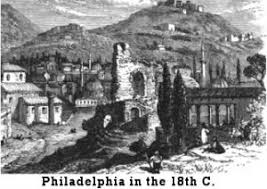 To a church that is responsive and ready to be used, the Lord will use his power to "open and shut" to make their enemies respect them and openly acknowledge God's blessing upon them. We saw this phrase, "the synagogue of Satan," used also in the letter to the persecuted church at Smyrna. It referred to certain Jews in that city who claimed to be spiritual descendants of Abraham but in actuality they were only his physical descendants; their attitude toward the truth of God was far removed from Abraham's faith. The Lord himself continually confronted the Pharisees who claimed to be Abraham's descendants, but Jesus said to them, "You are of your father the devil," (John 8:44). So here in the city of Philadelphia Jesus refers to this Jewish opposition as "the synagogue of Satan." But something amazing happens. What causes them to come at last and bow before the church and acknowledge God's blessing upon them? It is because the church responds to the opposition and hostility with love and with obvious knowledge of God which these Jews do not possess, even though they have the Scriptures. As a result, they come at last and acknowledge God's blessing on the church at Philadelphia.
To a church that is responsive and ready to be used, the Lord will use his power to "open and shut" to make their enemies respect them and openly acknowledge God's blessing upon them. We saw this phrase, "the synagogue of Satan," used also in the letter to the persecuted church at Smyrna. It referred to certain Jews in that city who claimed to be spiritual descendants of Abraham but in actuality they were only his physical descendants; their attitude toward the truth of God was far removed from Abraham's faith. The Lord himself continually confronted the Pharisees who claimed to be Abraham's descendants, but Jesus said to them, "You are of your father the devil," (John 8:44). So here in the city of Philadelphia Jesus refers to this Jewish opposition as "the synagogue of Satan." But something amazing happens. What causes them to come at last and bow before the church and acknowledge God's blessing upon them? It is because the church responds to the opposition and hostility with love and with obvious knowledge of God which these Jews do not possess, even though they have the Scriptures. As a result, they come at last and acknowledge God's blessing on the church at Philadelphia.
Some of you have been listening to Tuvya Zaretsky during our Sunday School hour telling of his Jewish upbringing and how resistant he was to the gospel and to Christians. Jesus was a name of anathema to him. He would grow angry just hearing people talk about Jesus. But he met Christians who treated him kindly and loved him despite his anger and hostility. Eventually he was brought to see that salvation lay in Christ. He became a Christian and is now working with Jews for Jesus in San Francisco.
On two separate occasions I have met with a group of knowledgeable, nationally known, Jewish rabbis, once in Los Angeles and again in Houston. During our second meeting one of the rabbis said something very striking. He said, "You premillennial evangelicals are the only ones among the Christians that we can really talk to because you believe there is a future for Israel. That enables us to communicate with you but these others have written us off and we have nothing much in common with them." That reaction is highlighted here by the fact that when you truly represent the love and compassion of Christ, and you understand the promises of the Old Testament, you can communicate with Jews anywhere and find that they will come to respect what you say and do. The third way in which our Lord will exercise the power of opening and shutting is given to us in the amazing promise of Verse 10:
"Since you have kept my command to endure patiently [again, that is not a good translation. What he really says is, "Since you have kept my word of patient endurance." This is a reference to the Lord's own endurance. He has been waiting until his enemies be made his footstool, for long centuries. "Since you have learned to wait like that," he is saying, "since you have kept my word of patient endurance], I will also keep you from the hour of trial that is going to come upon the whole world to test those who live on the earth." (Revelation 3:10 NIV)
That is a clear reference to what our Lord himself calls in Matthew 24 "the great tribulation" -- a time of distress that will come upon the whole world, the like of which has never been known before in human history, no, nor ever will be again. This will be the worst time of distress and bloodshed that the world has ever seen. We will find vivid descriptions of it as we go on in Revelation. And it is particularly sent "to test those who live upon the earth." That does not mean the residents of this planet. It is rather a reference to their mental attitude, their state of mind. It is referring to those who live as though this life is all there is, who are materialistically-minded, who live upon the earth and for the earth and for the things of earth. That is what the time of testing is sent to reveal.
But the promise to the church is specifically that it is to be delivered from the hour of trial. Actually the word is not "from," but "out of" -- to be delivered out of -- not just the trial but out of the very time of the trial! This is one of the clearest promises in the Bible of the catching away of the church before the great tribulation begins. It is a promise of the departure of the church, which Paul describes so vividly in First Thessalonians 4:
The Lord himself shall descend from heaven with a shout, with the voice of the archangel, and the trump of God; and the dead in Christ shall rise first, then we which are alive and remain shall be caught up together with them in the clouds to meet the Lord in the air, and so shall we ever be with the Lord. (1 Thessalonians 4:16-17 KJV)
A very wonderful promise, which many signs indicate may be very close at hand today. Viewed from the standpoint of Christian history, this church of Philadelphia foreshadows the great Evangelical Awakenings of the 18th and 19th centuries, following the time of declension among the Reformation churches: The Moravian Brethren in Germany began to meet in small groups for prayer, catching again a vision of God and what he could do, and eventually sent out missionaries to other parts of the world. It began in England as the movement which we call the Puritan Movement. John Bunyan, who wrote Pilgrim's Progress, was one of these Puritans; John Newton, whose hymns we sing so often, was another. This Awakening also encompasses the great Wesleyan Revival and George Whitefield's preaching in both England and America. In this country it includes the movement called the Great Awakening, with Jonathan Edwards as one of its leaders, and the Methodist Circuit Riders who rode horseback up and down the Eastern seaboard, later expanding westward when the nation began to move west. I personally have been benefited by one of these men, called Brother Van, who came to the Territory of Montana shortly after it began to be populated because of the gold rush. He went into the saloons and mining camps of Montana and preached the gospel, winning hundreds to Christ. He started churches all over the state, most of which are still there, but I'm afraid not doing very well. This was also a time of revival of missionary interest: William Carey in England got a vision of the need of India and eventually went out there and planted the gospel in a great work in that country. Robert Moffet and his famous son-in-law, David Livingstone, went to Africa and did marvelous work there. The American missionary, Adoniram Judson, went out to Burma and pioneered a work in that country. Hudson Taylor went to minister in inland China.
We have many other great missionary names that come out of this period of history. It is also the time of the emergence of great evangelists whose names we all remember -- George Whitefield, John Wesley, Charles Spurgeon (a pastor, but also a great evangelist), Charles Finney here in this country, and D. L. Moody, who left a great work behind him. All of these were foreshadowed by this church of Philadelphia which came alive amidst the death that characterized many other churches. Our Lord's appeal is given in Verses 11-13:
"I am coming soon. Hold on to what you have, so that no one will take your crown. Him who overcomes I will make a pillar in the temple of my God. Never again will he leave it. I will write on him the name of my God and the name of the city of my God, the New Jerusalem, which is coming down out of heaven from my God; and I will also write on him my new name. He who has an ear, let him hear what the Spirit says to the churches." (Revelation 3:11-13 NIV)
Once again we have a renewal of Jesus' wonderful promise, "I am coming soon." Many people ask when they read this, "How can he say that? This letter was written almost 2,000 years ago. The church has been expecting him ever since, but he still has not come. How could he have said to this church, 'I am coming soon?'" The answer is to see this promise in relationship to the context. He has just been describing a time when the greatest trial that the earth has ever known will come, the terrible great tribulation. He has described that very clearly in his Olivet Discourse, in Matthew 24. There we have a terrible picture of the sun being darkened, the moon not giving its light, stars falling from heaven, and men's hearts failing as they look in fear on the things coming to pass upon the earth. It is in relationship to that event that Jesus says he is coming soon. As the world nears that final, climactic upheaval we should hear again his promise that he is coming soon. He himself said, "When you see these things beginning to come to pass, lift up your head and rejoice, for your redemption is drawing near," (Luke 21:28). It is in that connection that he utters this promise to come soon.
In relationship to that his word is, "Hold on to what you have so that no one will take your crown." As the times get harder and it is even more difficult to be a Christian, as hostility increases and the world becomes more and more secular and casts aside much of the trappings of Christianity that it had formerly practiced, then we must be careful that we do not give up and go along with worldly attitudes and worldly pursuits. We must not allow a desire for status, prestige, fame, a beautiful home and the things the world lusts for, to become central in our thinking. "Hold on to what you have," says Jesus, because there is danger that someone may take your crown. That is not a reference to the possible loss of salvation. What it is speaking of is your opportunity for service in the eternal ages. That is the reward which is offered, the opportunity for even greater service. James I. Packer has well said:
The Christian's reward is not directly earned; it is not a payment proportionate to services rendered; it is a Father's gift of generous grace to his children, far exceeding anything they deserved. Also, we must understand that the promised reward is not something of a different nature tacked on to the activity being rewarded; it is, rather, the activity itself -- communion with God in worship and service -- in its consummation.
This is the truth that Paul teaches in First Corinthians 3. Speaking of Jesus as the foundation being laid in human hearts, the apostle says, "If any man builds on this foundation using gold, silver, costly stones, wood, hay or straw, his work will be shown for what it is, because the Day will bring it to light [this is the very Day that Revelation describes]. It will be revealed with fire, and the fire will test the quality of each one's work. If what he has built survives, he will receive his reward. If it is burned up, he will suffer loss; he himself will be saved, but only as one escaping through the flames," (1 Corinthians 3:12-15 NIV). Thus the crown of greater opportunity for service is what might be lost. Do not let anybody take that away from you, says Jesus. Do not lose the opportunities you have. Possess them, and you will receive a reward.
There are two promises given to the ones who overcome, who hold on to what they have: First, Jesus says, "I will make him a pillar in the temple of my God, and never again will he leave it." The four pillars on either side of this auditorium support the superstructure of this building. A pillar is a symbol of strength and permanence. Our Lord is promising those who hold on to what they have, a position in the life to come of strength and permanence; they will be someone who upholds things. In Galatians, the Apostle Paul refers to Peter, James and John as "pillars" of the church; the church rested upon them in some sense as they were imparting guidance and knowledge to Christians. In the Jerusalem temple which was destroyed in 70 A. D., there were two great pillars in front of the building, one called Jachin (which means "established, permanent"), and the other Boaz ("strength"). Pillars are thus symbols of strength and permanence. "Never again will he leave it," says Jesus. When you visit ancient ruins you will notice that often all that is left standing are the pillars. This promise of Jesus to never go out again is a reference to the experience of these Philadelphians who had frequently to flee the city because of the earthquake tremors that came. When you labor for me, says Jesus, you will reach a place where you will not have to go out ever again. It is a picture of security, permanence and strength.
Then, Jesus says, "I will write on him the name of my God and the name of the city of my God ... and I will write on him my new name." Three names will be written on the overcomer. A change of names would be meaningful to the Philadelphians because that city changed its name twice in its history. It called itself Neocaesarea when Tiberius helped it; and later on, in honor of Vespasian, one of the Flavian emperors, it changed its name to Flavia. (It later resumed the name Philadelphia.) Thus these people understood what it meant to have a different name.
Jesus says, "I will give you three names." Names reveal the character of the named: The first is, "the name of my God." This is a promise that believers will be made godlike. "Godliness" is a shortened form of the word "godlikeness." The purpose of the Spirit in our lives is to make us godly or godlike. If you are growing and maturing as a Christian, each year you ought to be a little easier to live with -- more patient, compassionate, understanding of others, and mature in your judgment. You should become more godlike. That is the promise to the believer who overcomes by faith. Second, Jesus says, "I will write [on him] the name of the city of my God." The last two chapters of Revelation give a vivid description of this wonderful city, the New Jerusalem, coming down from heaven "as a bride adorned for her husband" -- a beautiful bride meeting her husband. That again is a picture of loving intimacy; someone captured by the beauty and goodness of another and longing to be with him or her. That is the second promise given to those who hold on, who stand fast in the midst of a decaying world. They will know the intimacy of a husband's love for his beautiful bride. Last, says Jesus, "I will also write on him my new name." What is that? Since a name symbolizes one's character this is a reference to the fact that when our Lord's work of redemption is finished he will have a new name. Everyone wants to know what that new name is, but in Revelation 19:12 we are told that when Jesus appears he will have that new name written upon him, but it is a name that no man knows. Before Jesus was born in Bethlehem an angel appeared to Joseph and told him that Mary would bring forth a son, "and you shall call his name Jesus." Why? "Because he will save his people from their sins," (Matthew 1:21). Jesus is the redemptive name of our Lord. It means "Yahweh saves." But when the work of redemption is finished, when we are all home in glory with him and God's work of saving and redeeming us is over, Jesus will be given a new work to do. No one knows what it is; it will be a new role -- but the church is promised a share in those vast new labors! In the new heavens and the new earth redemption will no longer be required, but a new role will be given our Lord, and in that new work the church is called to share.
So we come again to our Lord's word of caution:
"He who has an ear, let him hear what the Spirit says to the churches." (Revelation 3:13 NIV)
Stop! Look! Listen! Hear the Spirit. Think through these letters. Pay attention to them, because they are spelling out your future destiny. (Ray Stedman, The Little Church that Tried, 1989)
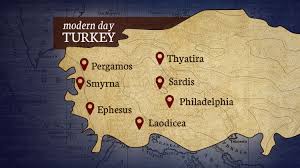

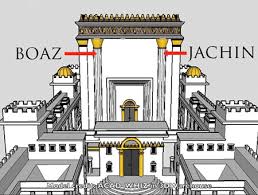
Please See

Three Stewards over God's House Shebna, Eliakim, and Jesus
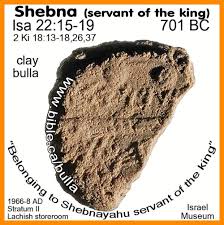 As many commentators have noted, the Old Testament is full of references to Jesus, Israel's Messiah--the Savior of the world. Beautiful and clear pictures about Messiah spring forth again and again through the book of Isaiah, images and clear descriptors written some 700 years before Jesus was born in Bethlehem.
As many commentators have noted, the Old Testament is full of references to Jesus, Israel's Messiah--the Savior of the world. Beautiful and clear pictures about Messiah spring forth again and again through the book of Isaiah, images and clear descriptors written some 700 years before Jesus was born in Bethlehem.
Some references to Messiah in the Old Testament and his future role in world affairs are less obvious and become clear after a little detective work in the New Testament. For example, the flow of the narrative in Isaiah Chapter 22 is interrupted by the account of one particular public figure, a high government official during the reign of King Hezekiah.
Thus says the Lord GOD of hosts: 'Go, proceed to this steward, to Shebna, who is over the house, and say: What have you here, and whom have you here, That you have hewn a sepulcher here, As he who hews himself a sepulcher on high, Who carves a tomb for himself in a rock? Indeed, the LORD will throw you away violently, O mighty man, And will surely seize you. He will surely turn violently and toss you like a ball Into a large country; There you shall die, and there your glorious chariots Shall be the shame of your master's house. So I will drive you out of your office, And from your position he will pull you down.
The man Shebna, entrusted with faithfully dispensing the king's resources and managing the affairs of government evidently had been quietly growing rich, feathering his own nest, at pubic expense. He had gone so far as to order an expensive private tomb built so he would be well-remembered after his death.
The Lord instructed Isaiah to inform Shebna that his term in office was finished and he would soon be thrown out of public office in disgrace. Next the prophet was told that a better man, an honorable, faithful steward would replace Shebna. The new steward of the house, Eliakim, would also be fatherly in his care of the King Hezekiah's subjects.
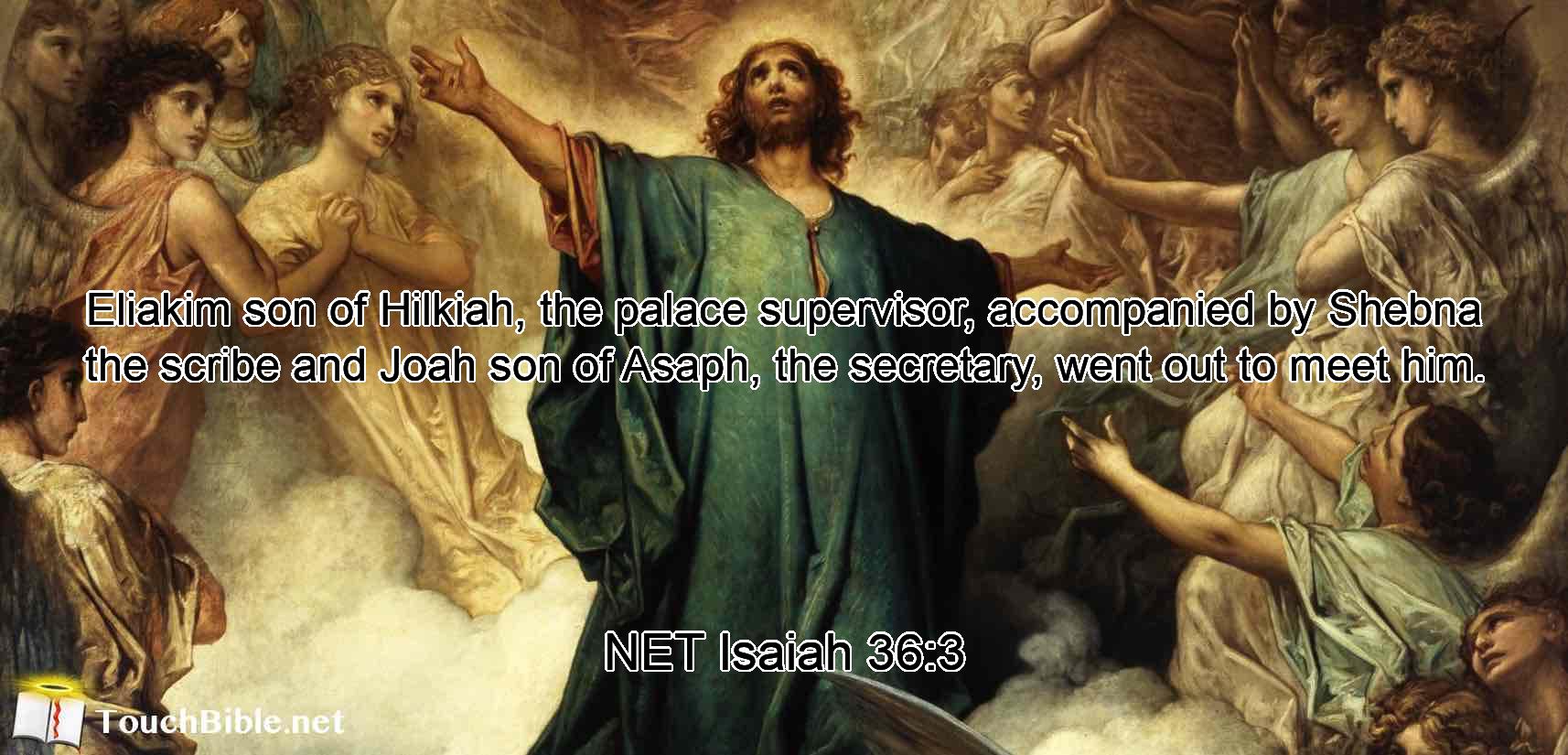
The prophet adds that Eliakim would be entrusted with the key to the house of David, (a term first mentioned here in the Bible). He would be secure in his office and future, a man of honor for many generations. But strangely at the end of the age, signified by the words 'In that day,' Eliakim and his lineage would be replaced.
The key of the house of David I will lay on his [Eliakim's] shoulder; So he shall open, and no one shall shut; And he shall shut, and no one shall open. I will fasten him as a peg in a secure place, And he will become a glorious throne to his father's house. They will hang on him all the glory of his father's house, the offspring and the posterity, all vessels of small quantity, from the cups to all the pitchers.
'In that day,' says the LORD of hosts, the peg that is fastened in the secure place will be removed and be cut down and fall, and the burden that was on it will be cut off; for the LORD has spoken.' (Isaiah 22:15-25 NKJV)
Who could a better ultimate replacement for Eliakim than Messiah himself?
Ultimately Jesus would be the faithful steward over all of Israel, during the coming Millennial Kingdom--possessing the key to the house of David.
If this were the only mention of the key of David in the Bible there would no need to marvel especially that Eliakim was a type of Messiah as faithful steward over Israel.
[Since Israel is to be the head of all the nations, and Jesus is to sit on the throne of his father David in Jerusalem, the nations can only be blessed when Israel has been reconciled to their God. And blessings to the gentiles--and to the church--will come through the conduit of believing Israel. We Christians need to always remember the admonition, "if some of the branches were broken off, and you, being a wild olive tree, were grafted in among them, and with them became a partaker of the root and fatness of the olive tree, do not boast against the branches. But if you do boast, remember that you do not support the root, but the root supports you." (Romans 11:17-18)
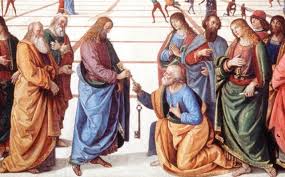 Suddenly out of nowhere the expression "the key to the house of David" reappears in the New Testament in words addressed to one of the Seven Churches in the book of the Revelation. The speaker is the Lord Jesus Himself:
Suddenly out of nowhere the expression "the key to the house of David" reappears in the New Testament in words addressed to one of the Seven Churches in the book of the Revelation. The speaker is the Lord Jesus Himself:
"And to the angel of the church in Philadelphia write, These things says He who is holy, He who is true, 'He who has the key of David, He who opens and no one shuts, and shuts and no one opens': 'I know your works. See, I have set before you an open door, and no one can shut it; for you have a little strength, have kept My word, and have not denied My name. 'Indeed I will make those of the synagogue of Satan, who say they are Jews and are not, but lie--indeed I will make them come and worship before your feet, and to know that I have loved you. 'Because you have kept My command to persevere, I also will keep you from the hour of trial which shall come upon the whole world, to test those who dwell on the earth. 'Behold, I am coming quickly! Hold fast what you have, that no one may take your crown. 'He who overcomes, I will make him a pillar in the temple of My God, and he shall go out no more. And I will write on him the name of My God and the name of the city of My God, the New Jerusalem, which comes down out of heaven from My God. And I will write on him My new name. 'He who has an ear, let him hear what the Spirit says to the churches.'" (Revelation 3:7-13)
Ray Stedman comments on the remarkable and unique role Israel's true steward Jesus was to have in the church which Jesus would build. Ray says,
In all the other letters [to the seven churches], our Lord uses symbols to describe himself that come from the vision John had of him, recorded in Chapter 1. In this letter, however, Jesus makes no reference to that vision. He uses other titles to describe himself. He tells them plainly who he is and what he does. Who he is is "the holy one" and "the true one." He is the holy one -- morally perfect. His character is without flaw or blemish. And he is genuine reality. He is the true one, the one behind all that really exists. That is who he is. What he does is: He "holds the key of David." That is a reference to an incident recorded in the 22nd chapter of the prophecy of Isaiah. In the days of Hezekiah the king there was a courtier (we would call him a chief-of-staff, for he was in charge of the palace) whose name was Shebna. He had been caught in a personal scam run for his own benefit, and as a result God says a very unusual, very descriptive thing about him: "I will take him and whirl him around and around (like a discus thrower), and hurl him into a far country," (Isaiah 22:18). It was a prediction that he would be sent into Babylon. He would be replaced by a godly man named Eliakim, of whom God said,
"I will place on his shoulder the key to the house of David. What he opens, no one can shut, and what he shuts, no one can open." (Isaiah 22:17 NIV)
Our Lord refers back to that passage in Isaiah and applies it to himself: "I am the one who shuts and no one can open, and opens and no one can shut." His will cannot be opposed. He governs the events of history on earth. He will open some doors; he will close other doors. What he opens no one can shut, what he shuts, no one can open. No human power can contravene what he determines. Now he tells the church, beginning in Verse 8, how he will use this power to open and shut.
"I know your deeds. See, I have placed before you an open door that no man can shut. I know that you have little strength, yet you have kept my word and have not denied my name." (Revelation 3:8 NIV)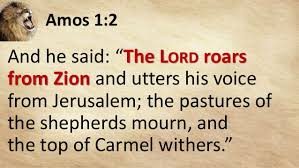
To a church like the church at Philadelphia the Lord says he will open doors of ministry and service, and no one can shut them. The Apostle Paul uses this analogy about himself. On his second missionary journey he tried to go into the province of Asia to preach the gospel but was forbidden by the Holy Spirit; it was a shut door. Then he tried to go into Bithynia, on the southern shore of the Black Sea, but was not allowed of the Lord -- another shut door. But when he came to Troas he had a vision of a man from Macedonia, and he learned that the Lord had opened a door for him into Europe. Paul's commitment to enter that open door has changed the history of the whole Western world, affecting all of civilization since that time. It was an open door of tremendous significance which the Lord had opened for Paul. But in First Corinthians 16, he says of Ephesus, the capital of Asia, "A great door for effective work has opened to me, and there are many who oppose me," (1 Corinthians 16:9 NIV). So the door which had been closed to him once was opened to him later by the Lord.
We are seeing something unusual in this line today [1989]. Without any announcement, the Lord has, to everyone's surprise, opened doors in Poland, East Germany, Czechoslovakia and Hungary; doors which had been closed for decades. It is wonderful to see how the people are responding to that open door. Yet not far away from these countries is a closed door. Albania, on the shores of the Adriatic, is the most closed country in the world to the gospel. Christians are forbidden to practice their faith there. No churches are allowed. It is a tightly closed door. There are other countries of Eastern Europe that remain closed as well. We are encouraged to pray for these, but it takes the One who "opens and no man shuts, and shuts and no man opens" for those prayers to succeed.
I must make a correction to the NIV text at this point. The words, "I know that you have little strength," is not what the Greek text says. I am sometimes amazed at these modern translations. There is no word in Greek for I know. What it literally says is, "...because you have a little power and have kept my word and have not denied my name." The church is being given the reasons why the Lord opened a door for them. What the text actually says is, "I have placed before you an open door that no one can shut because you have a little power and have kept my word and not denied my name."
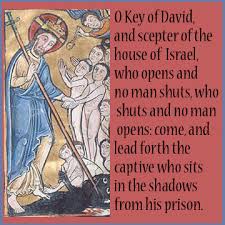 That teaches us something very important. It says that an open door is given when a church fulfills the conditions that will allow it to move through that door once it has been opened. Chief among those conditions is that it have discovered the power of the Spirit. It is spiritual power the Lord is talking about. It is not so much strength as it is power -- power obtained by faith, i.e., by expecting God to act. Individuals in the church sense that God can do something. They look for an opportunity, a need to appear, and when they respond, a door opens for continued service which may grow even wider so others may enter with them.
That teaches us something very important. It says that an open door is given when a church fulfills the conditions that will allow it to move through that door once it has been opened. Chief among those conditions is that it have discovered the power of the Spirit. It is spiritual power the Lord is talking about. It is not so much strength as it is power -- power obtained by faith, i.e., by expecting God to act. Individuals in the church sense that God can do something. They look for an opportunity, a need to appear, and when they respond, a door opens for continued service which may grow even wider so others may enter with them.
I believe Ephesians 2:10 is in some ways the most exciting verse in the New Testament. The Apostle Paul says, "We are his workmanship [this word poiema has also been translated "masterpiece"] created in Christ Jesus unto good works." That is why you have been made a Christian -- that you might do good works -- deeds of help, mercy, kindness, witness, love, comfort, counsel and strength. That is what each member of the church is capable of doing. We are "created unto good works." And then comes the exciting part: "which God has prepared beforehand for us to walk in them." When you are confronted with a need it may appear rather insignificant at first. Perhaps it is a neighbor with a heavy heart; perhaps it is a family member who has what may appear to be a fairly minor problem. When you respond to that, however, it becomes an open door.
Ministry may grow out of it which will challenge and encourage and bless you as you go on. Notice that the Lord says to this church at Philadelphia, "you have a little power." That realistically stresses the fact that most, if not all, churches hardly realize the potential they have for ministry. I have often thought that it applies to us. Twice this morning I have had the privilege of addressing a large congregation. Each one of you who know Christ has been given spiritual gifts and has been commissioned by him to use those gifts to bless people and meet their needs. Yet how few of us enter into this! What vast potential resides in a single congregation if everyone would exercise the ministry that has been given you to utilize the spiritual gifts that have been given to each! That is why the Lord says of this church at Philadelphia, "You have some power, but not much." He is hoping they will increase that potential for ministry.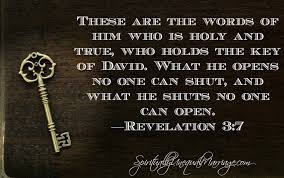
We need to remember that the presence of the Spirit is promised to each church without any condition whatsoever. When we know Christ the Spirit comes to live within our hearts and to reside there. But the power of the Spirit is given only to those churches who learn to keep his word and to not deny his name! Those two things are central in the ministry of every church. First, there must be the Word. Always God plants his Word at the heart of his church. We must preach it, teach it, study it, and truly know it. And it is not just for the leadership, but everybody in the church is to know God's Word. The Bible is the most amazing book the world has ever seen. It conveys insights into life that you will find in no other place. No great university in the land can give you an understanding of life that this Book will give you. Therefore we must keep it, know it, walk in it and love it. We must soak ourselves in the Word! But beyond the Word is the Lord himself. One of our old hymns puts it this way,
Beyond the sacred page I seek Thee, Lord.
My spirit pants for Thee, O Living Word.
It is the Word which enables us to know the character of Jesus, to have fellowship with him, and to not deny that character in our lives. We are to reflect in our lives all that his name stands for. We are to know him as present with us at all times, and seek to conform our behavior to his life. Those are the qualities it takes to enter into the open doors which the Lord gives to a church and to the individuals in it. (Ray C. Stedman, The Little Church That Tried).

Seven Churches
Seven Representative Churches are described for us in Revelation chapters 2 and 3. They have been sequential in history as each type of church has had its day in history. Philadelphia has a special rapport with Israel.
When a given individual in the world today enters into a personal relationship with Jesus, that individual should seek fellowship in a local church where the Bible has centrality. He or she will find himself in an imperfect assembly of all ages and stages. Special attention is given to “overcomers” in each church In the Seven Letters.
It is true that the general state of the church of Jesus Christ today is Laodicean. But as an individual Christian today attending a particular local church (which you may personally be attending), you may have some different beliefs compared to the status beliefs of your church. Your core beliefs define which of the seven churches you identify with the most. If you have never belonged to a local church, read the descriptors of each of the seven churches and see which group best fits what you now! Pay special attention to the “overcomers” in each church and aim for that place in heaven. Why settle for second (or third) best?
The Overcomers in Each Group
Ephesus: “To him who overcomes I will give to eat from the tree of life, which is in the midst of the Paradise of God.”
Smyrna: “He who overcomes shall not be hurt by the second death.” ’
Pergamos: “To him who overcomes I will give some of the hidden manna to eat. And I will give him a white stone, and on the stone a new name written which no one knows except him who receives it.”
Thyatira: “And he who overcomes, and keeps My works until the end, to him I will give power over the nations—‘He shall rule them with a rod of iron; They shall be dashed to pieces like the potter’s vessels’—as I also have received from My Father; and I will give him the morning star.
“He who has an ear, let him hear what the Spirit says to the churches.”
Sardis: “He who overcomes shall be clothed in white garments, and I will not blot out his name from the Book of Life; but I will confess his name before My Father and before His angels.
“He who has an ear, let him hear what the Spirit says to the churches.”
Philadelphia: "And he who overcomes, and keeps My works until the end, to him I will give power over the nations—
‘He shall rule them with a rod of iron;
They shall be dashed to pieces like the potter’s vessels’—
as I also have received from My Father; and I will give him the morning star.
“He who has an ear, let him hear what the Spirit says to the churches.”
Laodicea: “Behold, I stand at the door and knock. If anyone hears My voice and opens the door, I will come in to him and dine with him, and he with Me. To him who overcomes I will grant to sit with Me on My throne, as I also overcame and sat down with My Father on His throne.”
If any one of us moves on beyond kindergarten Christianity—as the Bereans in Ancient Greece did—we may well be Philadelphians without knowing it.
“These were more fair-minded than those in Thessalonica, in that they received the word with all readiness, and searched the Scriptures daily to find out whether these things were so.“ (Acts 17:11)
The True Church, which Jesus Christ has been building for two thousand years, is embedded in the various cultures of the world and is presently invisible.
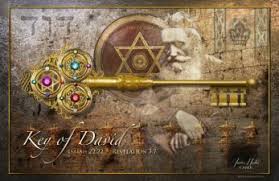
Since Jesus the Lord of the churches is himself a steward, it is a high calling for all of us Christians to serve our Lord as under-stewards.
The Apostle Paul recognized this when he reminded the church at Corinth of his calling as an apostle,
"Let a man so consider us, as servants of Christ and stewards of the mysteries of God.
Moreover it is required in stewards that one be found faithful." (1 Corinthians 4:1,2)
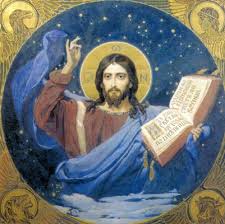
Jesus Christ Pantokrator



Lambert's Main Library
Email Lambert Dolphin|
Archive for Newsletters
Library Annex (Articles since 2018)
August 2, 2021, February 28, 2022. September 18, 2022. December 8, 2022.
Comments, suggestions, critiques are welcome.


 To a church that is responsive and ready to be used, the Lord will use his power to "open and shut" to make their enemies respect them and openly acknowledge God's blessing upon them. We saw this phrase, "the synagogue of Satan," used also in the letter to the persecuted church at Smyrna. It referred to certain Jews in that city who claimed to be spiritual descendants of Abraham but in actuality they were only his physical descendants; their attitude toward the truth of God was far removed from Abraham's faith. The Lord himself continually confronted the Pharisees who claimed to be Abraham's descendants, but Jesus said to them, "You are of your father the devil," (John 8:44). So here in the city of Philadelphia Jesus refers to this Jewish opposition as "the synagogue of Satan." But something amazing happens. What causes them to come at last and bow before the church and acknowledge God's blessing upon them? It is because the church responds to the opposition and hostility with love and with obvious knowledge of God which these Jews do not possess, even though they have the Scriptures. As a result, they come at last and acknowledge God's blessing on the church at Philadelphia.
To a church that is responsive and ready to be used, the Lord will use his power to "open and shut" to make their enemies respect them and openly acknowledge God's blessing upon them. We saw this phrase, "the synagogue of Satan," used also in the letter to the persecuted church at Smyrna. It referred to certain Jews in that city who claimed to be spiritual descendants of Abraham but in actuality they were only his physical descendants; their attitude toward the truth of God was far removed from Abraham's faith. The Lord himself continually confronted the Pharisees who claimed to be Abraham's descendants, but Jesus said to them, "You are of your father the devil," (John 8:44). So here in the city of Philadelphia Jesus refers to this Jewish opposition as "the synagogue of Satan." But something amazing happens. What causes them to come at last and bow before the church and acknowledge God's blessing upon them? It is because the church responds to the opposition and hostility with love and with obvious knowledge of God which these Jews do not possess, even though they have the Scriptures. As a result, they come at last and acknowledge God's blessing on the church at Philadelphia.

 As many commentators have noted, the Old Testament is full of references to Jesus, Israel's Messiah--the Savior of the world. Beautiful and clear pictures about Messiah spring forth again and again through the book of Isaiah, images and clear descriptors written some 700 years before Jesus was born in Bethlehem.
As many commentators have noted, the Old Testament is full of references to Jesus, Israel's Messiah--the Savior of the world. Beautiful and clear pictures about Messiah spring forth again and again through the book of Isaiah, images and clear descriptors written some 700 years before Jesus was born in Bethlehem.
 Suddenly out of nowhere the expression "the key to the house of David" reappears in the New Testament in words addressed to one of the Seven Churches in the book of the Revelation. The speaker is the Lord Jesus Himself:
Suddenly out of nowhere the expression "the key to the house of David" reappears in the New Testament in words addressed to one of the Seven Churches in the book of the Revelation. The speaker is the Lord Jesus Himself:

 That teaches us something very important. It says that an open door is given when a church fulfills the conditions that will allow it to move through that door once it has been opened. Chief among those conditions is that it have discovered the power of the Spirit. It is spiritual power the Lord is talking about. It is not so much strength as it is power -- power obtained by faith, i.e., by expecting God to act. Individuals in the church sense that God can do something. They look for an opportunity, a need to appear, and when they respond, a door opens for continued service which may grow even wider so others may enter with them.
That teaches us something very important. It says that an open door is given when a church fulfills the conditions that will allow it to move through that door once it has been opened. Chief among those conditions is that it have discovered the power of the Spirit. It is spiritual power the Lord is talking about. It is not so much strength as it is power -- power obtained by faith, i.e., by expecting God to act. Individuals in the church sense that God can do something. They look for an opportunity, a need to appear, and when they respond, a door opens for continued service which may grow even wider so others may enter with them.



